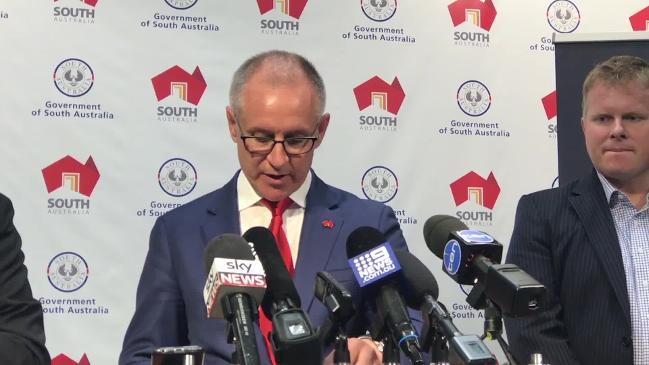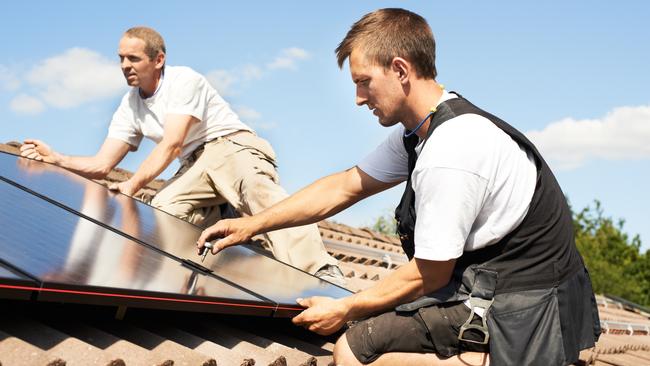Householders urged to do their homework on solar panels and batteries
Disgruntled solar panel owners are making complaints to South Australia’s consumer services watchdog on average every three days, new figures reveal.

Disgruntled solar panel owners are making complaints to South Australia’s consumer services watchdog on average every three days, new figures reveal.
As growing numbers of homeowners consider the virtues of solar panels and battery storage to drive down household power bills, Consumer and Business Services statistics show that the watchdog dealt with 122 complaints about solar panels last financial year.
The Sunday Mail can reveal the new statistics come as Choice, the leading consumer advocacy group in Australia, urges homeowners to be on the lookout for shonky solar panel and battery installers.
A CBS spokesman said the most typical complaint related to solar panels involved inverter failure, where delays in replacing or repairing the inverter meant the consumer was paying standard, non-solar power prices in the interim.
“Disputes often centre around the losses suffered by the consumer due to the time taken to fix the problem,” he said. “Other issues involved traders reluctant to replace inverters that fail multiple times, especially if the manufacturer no longer exists.”

Choice spokeswoman Nicky Breen told the Sunday Mail it was important consumers did some homework before rushing into purchases.
“With homeowners worried about rising electricity costs, it’s little wonder many are turning to solar power. However, given the complexity surrounding solar it’s vital to do your homework,” Ms Breen said. “Whatever system you buy the most important thing to check is that panels meet the required standards and the installer is Clean Energy Council accredited.
“CEC accreditation will not only help you avoid shonky installers but is also necessary to access any government rebate you may be entitled to.”
Ms Breen said while it can be tempting to look at batteries when thinking about installing solar, the main pitfall for many homeowners is cost.
“Batteries are still relatively expensive and the payback time will often be longer than the warranty period of the battery,” she said. “This means in many cases it’s cheaper to feed energy in to the grid and simply buy additional electricity when you need it.
“If you’re worried about blackouts, it’s worth noting that if you have a battery and are still connected to the grid, the battery won’t necessarily protect you from an outage.”
SA’s Energy and Water Ombudsman Sandy Canale last financial year received 151 complaints relating to solar energy bills.
The report showed Mr Canale also received 414 complaints prompted by a new metering contestability regime after the Federal Government allowed retailers to install smart meters for the first time.
WHAT TO ASK WHEN BUYING SOLAR PANELS?
Ask the company to specify the brand, model number and quantity of panels and any other components, on the quote to ensure they’re not swapped out during installation. Ask about the warranties for the system and its components; the product and performance warranties for the panel, the mounting frames for the panels, the inverter, the battery and for the wiring and general installation.
Ask for all details of your new energy plan including the Feed-in Tariff, the cost to buy electricity from your retailer and any additional fees.
WHAT SHOULD I LOOK FOR WHEN BUYING SOLAR PANELS?
First work out how much energy you use so you have some idea of the size of the system you need. It may also be tempting to go for the cheapest panels possible but remember the panels are only part of the solar power system.
Look at the cost as a whole before making a purchase. Be sure to get multiple quotes before signing up for solar to ensure you get the best deal.
WHAT TO ASK WHEN BUYING A BATTERY?
There is no one-size-fits-all when it comes to solar.If you’re buying a battery for your solar system, the most important thing you need to know is how the battery will work for you, balancing the output of your panels with the energy needs of your home. If the retailer can’t explain that in detail, you’re probably better off going elsewhere.
WHAT SHOULD I LOOK FOR WHEN BUYING A BATTERY?
Crunch the numbers: How much will the system cost? What are the payback times and how will it affect your Feed-in Tariff?
You will lose the FiT on every Kilowatt you spend charging your battery.
Make sure the battery is CEC accredited.
Avoid any deals that are either low on detail or appear too good to be true.
If it’s not worth getting a battery immediately, if you’re installing a new system you may want to consider getting one that is battery ready, so you have the option of adding a battery at a later date.
